Veteran’s Testimony – Edna L. Haertig 59th Evacuation Hospital
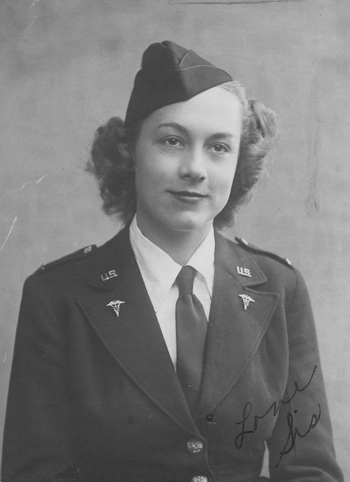
Photograph of 1st Lt Edna Lillie Haertig Atkinson (ASN:N-734765) upon enlistment into the Army Nurse Corps.
Introduction:
Edna Haertig was born on 12 January 1918 on a farm in Bonnie View, Texas. She graduated from Woodsboro High School in 1934, and attended Texas State College for Women in Denton for a year where she took classes in Business Administration. When a local doctor learned she wanted to be a Nurse, he gave Edna a job in his hospital. She worked 12 hours a day, 6 days a week for a dollar a day. On February 6, 1938, Edna entered the John Sealy College of Nursing, which was affiliated with the University of Texas Medical Branch in Galveston. She graduated February 8, 1941 with a degree in nursing. She worked as a General Duty Nurse for the John Sealy Hospital in Goliad, Texas, from 8 February 1941 until 15 November 1941.
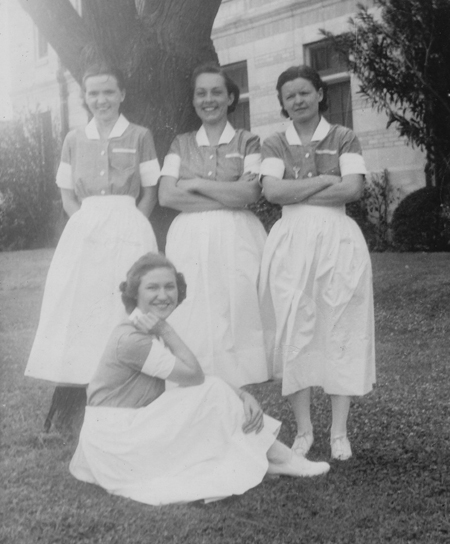
Edna Haertig and three friends pose for the camera during their courses at the John Sealy College of Nursing. Photograph taken in 1941.
From 1 December 1941 through 3 February 1942, she worked in Corpus Christi as a private Nurse. At the time of the Japanese attack on Pearl Harbor, 7 December 1941, Edna was playing bridge with several friends in Corpus Christi and heard the news over the radio. In January 1942, she and two of her nursing classmates enlisted in the Army Nurse Corps.
Enlistment:
Edna Haertig reported for active duty on 6 February 1942 at Fort Sam Houston, San Antonio, Texas (Military Reservation –ed). Other John Sealy Nurses enlisting at the same time were: Alpha Elliott and Janet Yelderman. They were assigned to the Station Hospital until 3 June 1942, working hard and keeping late hours.
On 1 June 1942 the women received orders to report to Camp Blanding, Starke, Florida (Infantry Replacement Center –ed), for assignment to the 3d Station Hospital (activated 18 March 1942, embarked for England 1 July 1942 –ed) – for overseas service. On 22 June, Edna’s unit left Fort Blanding for Fort Dix, Wrightstown, New Jersey (Training and Pre-Staging Center –ed), by way of Third United States Army and Fourth Corps Area Headquarters, Fort McPherson, Atlanta, Georgia (Reception and Reclassification Center –ed). At Fort Dix, she received Officer-orientation training but no additional medical training, and was commissioned as a Second Lieutenant. On 30 June she accompanied the 3d Station Hospital to the New York Port of Embarkation and boarded the “Argentina”, which carried some 8,000 troops, sailing as part of a large convoy 1 July 1942 for England.
They arrived 10 July at Glasgow in the Firth of Clyde, Scotland, and went by train to Lichfield, England. By 6 August they were settled in a Hospital at Tidworth (west-southwest of London). Initially, they stayed at Tidworth Castle, the house Lord Nelson gave Lady Hamilton, but soon moved into quarters closer to the Hospital.
1943:
After a few months of tranquil duty in England, Nurse Haertig was ready for a change and volunteered for duty with the 26th General Hospital (activated 1 February 1942, embarked for England 20 October 1942 –ed). “I wanted to get a little closer to the action. I still was not close enough. On 12 January 1943 Alpha (Elliott), Dutchie (Janet Yelderman) and I received orders to report to the 26th General Hospital for shipment to North Africa.” On 13 January 1943, they left the 3d Station Hospital in Tidworth and reported for duty with the 26th General Hospital, then being deployed to further support the Allied invasion forces in North Africa. She arrived in Oran, Algeria, on 1 February 1943. “We stayed by the Mediterranean for three weeks, then set up on “Goat Hill” (aka Mud Hill) on the other side of Oran for another three weeks.”
End of April, they went by train to Constantine, Algeria, and set up the Hospital under tentage at Bizot; the first General Hospital to set up in tents (where it would remain until October 1943). In this area, the Arabs took great pleasure in pilfering Army supplies at every opportunity. Edna recalled one time when they stole the tarps from around the latrine, while one of the Nurses was inside. She also could never forget when a little Arab boy wanted to buy her…as a present for his father!
As the North African campaign turned in favor of the Allies, Edna’s unit began to make plans to move. She then learned that the 59th Evacuation Hospital (at Palermo since 8 August) was looking for Nurses, Edna subsequently requested a transfer to join them. “I still could not hear the cannon fire. In early October, I requested transfer to a field unit and received my orders to report to the 59th Evac in Sicily.” On 13 October “I flew from Tunis to Palermo, Sicily, and reported to my new Chief Nurse. I liked the outfit immediately – remaining with them the rest of the war in Europe. I have many pleasant memories.”
The 59th Evac was set up in dorm rooms at the University of Palermo Polyclinic. Each morning, young boys would sing outside the Nurses’ windows in the hopes of receiving candy or cookies. Also while there, Edna Haertig sent her brother Bob a photograph of the view from her window. Bob, an artist, later did a painting of the picture and presented it to Edna. “While in Palermo, I enjoyed many parties and made many new friends – even though the work was hard, Bette (Holmes), Bert (Moore) and Jo (Burnett) became my new team mates.” While working at 59th, Edna’s nickname was “Tex.” Edna remembered attending the opera “La Bohême” while in Palermo; the crowd was very raucous. She recalled that the male lead was very short while Mimi was a very large woman. Every time he tried to hug her, the crowd roared!
1944:
“In March, Jo and I had a seven-day leave to North Africa. We chose Cairo, Egypt, and hitched by air. It was an interesting trip, and delightful I might add. We had two nights in Tripoli (at the Albergo del Mehari Hotel).” They also spent one night in French Morocco, at a British camp. While in Morocco, they went to a club where the show was a Moroccan dancer wielding a scimitar. She recalled that he cut himself repeatedly but did not bleed.
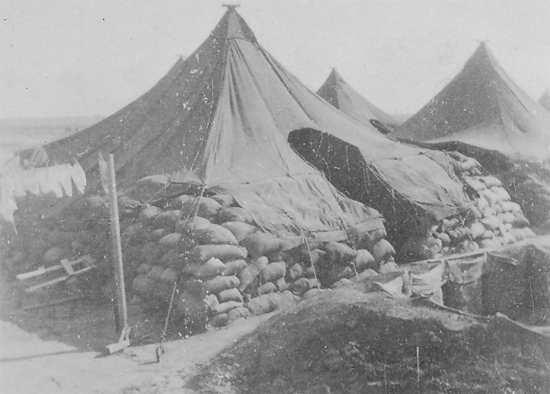
Illustration showing one of the heavily-fortified Pyramidal Tents belonging to the 59th Evacuation Hospital set up at Anzio. Photograph taken in June 1944.
“In the latter part of May we sailed for Italy on a Liberty Ship and docked in Naples four days later – no mishaps, but a few anxious moments.” The unit proceeded to Sessa, Italy (north-northeast of Naples), but did not set up a hospital. Edna and 39 other Nurses were placed on detached service. She was on TD with the 56th Evacuation Hospital. While on temporary duty with this unit, the 59th relocated to the Anzio Beachhead.
On 9 June, Edna returned to the 59th and arrived in the Anzio area. “At long last we rejoined our outfit and set up on Anzio, where we stayed for five weeks.” There were a lot of wounded soldiers in this area due to major battles having taken place in the region, with more losses caused by enemy bombing of the beachhead. Edna reported that many of the soldiers were hurt too badly to move. Many of the Nurses (in the 38th Evacuation Hospital which the 59th relieved on 7 June) were also in bad shape, mentally and emotionally. Her unit came in to help with the situation. During their time here, their main job consisted in evacuating patients to General Hospitals in the Naples-Caserta area. The Nurses generally worked 12-hour shifts, seven days a week. “I learned more about nursing here than I did in nursing school. We learned on the job. We had to improvise. It was such a dramatic time. There was so much blood and mayhem going on.” At Anzio, she was finally close enough to the action (within six miles of the front) to hear the impact of the artillery rounds and see Allied and German airplanes fighting overhead.
Edna departed Anzio on 11 July and traveled to Paestum (on the beach southeast of Salerno, and near Battipaglia) where they staged from 16 to 27 July, 1944, functioning as a kind of Station Hospital. On 2 August 1944, Edna was entitled to a little bronze star representing the Rome-Arno Campaign. In mid-August, the unit staged in Naples for another 3 or 4 weeks. “In the meantime, we did a lot of sightseeing – Pompeii, Mt. Vesuvius, Salerno, Sorrento, etc. We were killing time for the big event – the Southern France Invasion.” Edna got to meet Eve Curie (daughter of Marie Curie) in person. Her scrapbook included a lock of hair from the female soldier who modeled the Army fatigues for Miss Curie.
“15 August 1944 – the Southern France Invasion – We went in on D-10, a Hospital Ship. Most miserable of all my boat trips. After debarking, they set up our Hospital (about 110 miles inland from Ste. Maxime where they landed) at a place called Carpentras (north-northwest of Marseille).” Local French people brought the Nurses flowers, even while they were in the shower. It was here that the unit benefited from the cooking of a French chef. “When we landed in Southern France, our Commanding Officer found a French chef who was out of a job and hired him to be our cook – boy did we eat good! But we soon discovered we were no longer being invited to parties and dances from other units in the neighborhood. When inquiring about this we were told we all smelled like garlic. The chef had to go!”
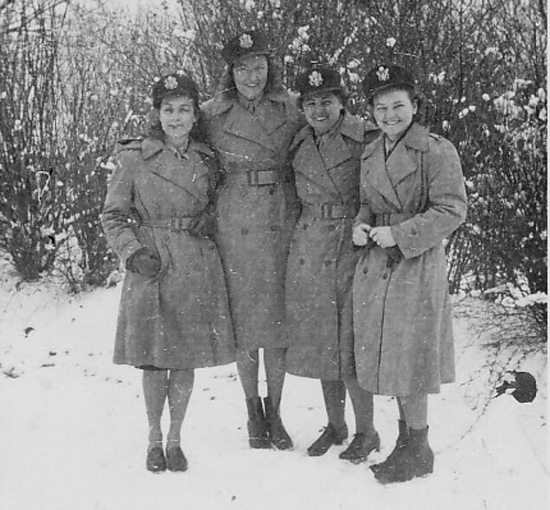
Edna and friends pictured in heavy snowfall while in Epinal.
“We were there for three weeks, working like beavers for a week. The front moved on. We shopped for perfume but were all broke. Our next set-up was at Rioz, north of Besançon, France, a 20-hour 240-mile truck ride from Carpentras.” The unit arrived at Rioz on 17 September 1944. Weather conditions made the roads around and through the hospital complex almost impassable.
“We stayed a week and then set up in Epinal, France, (in buildings) on 3 October. That was our main siege of working – two months of hard, steady work with no breaks.” Edna remembered that while in Epinal, a Doctor and a Nurse got married. She helped decorate, using carrot tops because there was nothing else around. Here they treated many Seventh US Army casualties from the battles across this specific region of France.
On 18 October 1944, Edna was entitled to another miniature bronze star for her participation in the Southern France Campaign.
The organization spent early December at Mutzig, Alsace. Here, the unit was housed in two large four-story buildings. On 14 December 1944, Edna’s best friend Bette Holmes married Sam Richardson of the 601st Tank Destroyer Battalion (which served in North Africa, Sicily, Italy, and France –ed). “At Christmas we had Santa Claus, red suit, beard and all, and presents for each patient. And all the Doctors and Nurses shared their liquor rations with the Enlisted personnel, for a grand holiday party.“
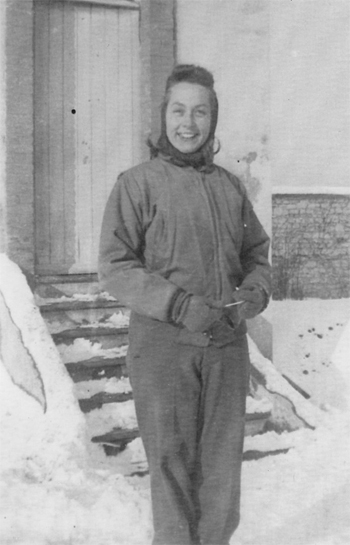
Edna photographed while at Epinal. Notice her uniform comprises a Winter Combat Jacket for extra warmth.
Late December, the Hospital withdrew to Epinal because of the German offensive in the area.“Our New Year’s Eve party was spent in Epinal.”
1945:
On 10 January, orders recommended that Edna be promoted to First Lieutenant. On 23 January 1945, while at Epinal, Edna was assigned on TD with the 95th Evacuation Hospital. During this time, she remembered being in a group traveling on a good road in France and thought they would take a quick detour into Germany for fun. They got cold feet at the border and turned back.
On 1 February, Edna received her “temporary” promotion to First Lieutenant. In mid-February, she returned to the 59th Evac.
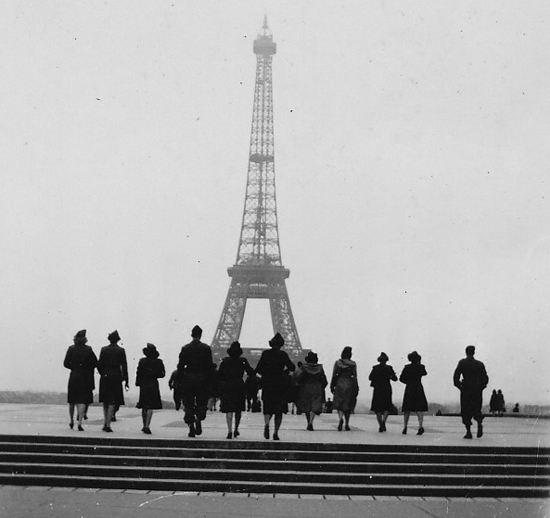
Personnel of the 59th Evac Hosp enjoy the sights of Paris.
“In March, Bert, Jo and I had a three-day pass to Paris. What a trip! Bert and I came back with French hairdos and orchids.” They traveled by train. While in Paris, they got to see the “Arc de Triomphe”, the “Folies Bergère” and the Glenn Miller band, which Edna said was standing room only. Edna, Bert and Jo stayed together, walked a lot around sightseeing, and slept on the train. They saw Marie-Antoinette’s home and the sculpture gardens at the Palace of Versailles. While visiting the gardens, they needed to go to the bathroom so badly they hid among the statues. In Paris, one of the Nurses (Nellie) visited a real beauty shop and got her eyelashes done. Edna and Bert put their hair up to make others think they too had gone high fashion while in Paris. “We returned tired but triumphant!”
“Spring in France is glorious. To brighten the mood of the patients, we Nurses gathered armfuls of lilacs and put them in all the tents. At Easter we made Easter bonnets from fresh sweet flowers and paraded through the tents.”
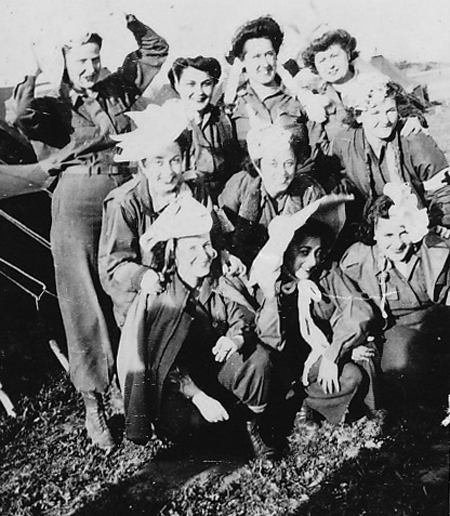
Edna and other Nurses of the 59th pose with their Easter bonnets made from fresh flowers.
By mid-March, the 59th Evac Hospital secured a site near Saint-Avold (97 miles northeast of Epinal, in the Moselle region) and operated as a Hospital in a tented facility for the first time since October. “We had only been back from Paris a week when we moved to set up in Saint-Avold, France. The Rhine crossing was close at hand. While there, Bert, Jo and I went looting in Saarbrücken, Germany. I’ve never seen a city more destroyed – but we looted. We got two rugs for our tent, two big red pillows, two dozen cocktail glasses (and a large beer mug from a local bar), a champagne bucket and a radio to get news from home.” They left the radio behind when they moved on. The Germans had only recently moved out and the GIs had not yet fully secured the area. Edna remembered that they went into one building and a door began to move so they got scared and ran.
“We stayed only a week at this site – then moved to Grünstadt, Germany, where we set up for three weeks. The Rhine was crossed and we moved to Heidenheim, Germany (in fact Schnaitheim). We were established there for a few weeks, and then the war in Germany was over.”
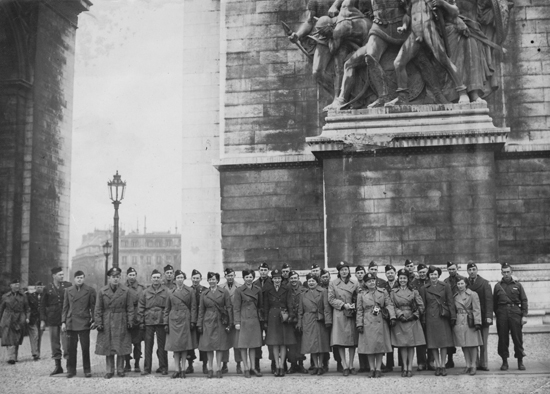
Photograph showing the entire group of personnel while on leave in Paris. Edna is standing third from right on the front row.
Edna Haertig and several other Nurses conspired to get their minds off the war with an evening of music and dancing. They made fancy formal gowns to wear to the dances out of silk parachutes acquired from American pilots.
Later in April, the Hospital relocated to Crailsheim, Germany. On V-E Day (8 May 1945) Edna remembered riding in a Jeep with several Nurses from her unit into Wiesbaden, Germany, to attend an evening dinner party and dance. While there, they heard on the radio that the war was over and wanted to get back to tell their unit as quickly as possible. The Officers they were with gave Edna and five other Nurses a German convertible to drive back so they could spread the word that Germany had surrendered. Edna drove (she was the only one who hadn’t consumed a lot of wine with their dinner and was still sober). En route, the car caught fire under the hood and began to smoke (she thought the radiator needed water). They pulled off the road, close to several houses. When lights started coming on and they heard German voices, they got scared and abandoned the car and took off running. They hitched a ride on an Army truck back to their unit. Upon arriving, they informed the Commander who yelled around the camp that the war was over.
In August, “the 1st Infantry Division showed its fangs and the parties started. They were stationed between Dinkelsbühl and Ansbach (the ones we knew).” Her scrapbook includes invitations from the “Big Red One” for parties on 1 August 1945 (Edna wrote on this one ‘First V-E party and an anniversary party’) and 11 August. “Some parties these guys gave! We always went formal and wore flowers in our hair.”
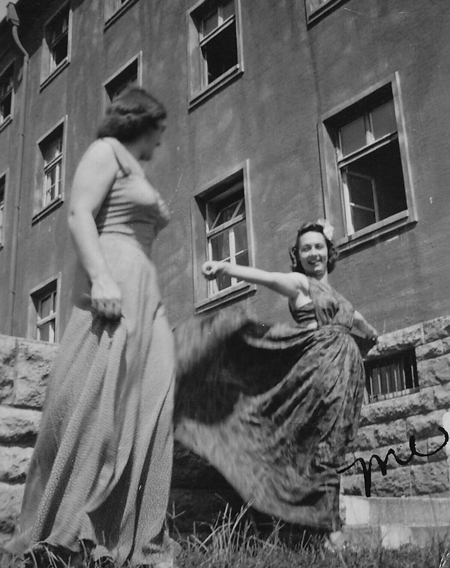
Edna models one of the formal gowns produced from the silk parachutes acquired from American pilots.
“We then moved to Ellwangen, Germany, into buildings no less, and set up our Hospital again. We did not work very hard – had lots of time to play. Redeployment started, our Hospital was split up and a new crew moved in. Trips about the surrounding country were organized. Bert and I took a trip to Berchtesgaden, Hitler’s Retreat in the Bavarian Alps (12 miles from Salzburg).” Edna remembered the long, beautiful conference table inside. There were GIs standing guard. Edna and several other Nurses went. One of the GIs gave her a silver cup from Hitler’s personal set. Her scrapbook includes a map of Obersalzberg – Hitler’s Mountain Retreat. “Our trip included Munich, Berchtesgaden (they stayed in the Hotel Berchtesgadener Hof), Oberammergau (in Austria), Parisian plays held here, Innsbruck – winter sports, Linderhof – famous castle. Then back to Ellwangen, to the daily routine of living and trying to be happy.”
On 10 August 1945, the Army presented the Meritorious Service Unit Plaque to the 59th Evacuation Hospital for outstanding service from 5 October 1944 through 30 December 1944. Late August, while the 59th was still set up in Ellwangen, even though she could have gone home, Edna did not want to go by herself so elected to visit the French Riviera instead. “Mac (Eleanore McIntyre) and I went to the Riviera, Southern France, and had a simply glorious time – out of this world.” They stood on the balcony of the mansion later occupied by Prince Rainier and Princess Grace. In reference to brochures in her scrapbook, she said, “All about the Riviera – some friends of mine’s autographs in the rear. We organized the ‘Beachcomber’s Society.’ “
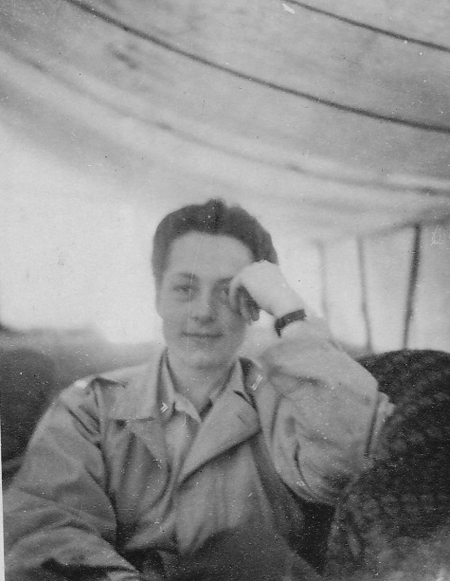
Edna takes some time to relax in one of the Hospital’s tents whilst in Germany.
In September, after the Riviera trip, the Nurses returned to their unit. “When we got back from the French Riviera, my going home orders had come in – at long last. So the fun started – there were quite a lot of us.” Orders dated 11 September 1945 relieved her from the 59th Evacuation Hospital and assigned her to the 103d Evacuation Hospital. She reported on 14 September. On 24 September, Edna arrived at Camp Carlisle.
On 27 September, Edna and 9 other Nurses were granted 7 days leave in Switzerland. Army rules said they could not spend more than $35.00. “While we were staging in Reims, France, we had a chance to go to Switzerland, so Bert (Bertha Moore), Jo (Josephine Burnett), Margie (Weller), Irene (Yagmin) and myself went (there were 10 Nurses altogether).” They stayed the first night in the Hotel Schweizerhof in Lucerne, and took a boat ride on the Four Cantons Lake. According to the Swiss tour pamphlet, she got to visit Lucerne, Meiringen (second night here in the Hotel Brunig), Interlaken, Lausanne (3 days in the Hotel Lausanne-Palace), Berne, Soleure and Basle. “The week in Switzerland was heavenly, indescribable, delightful! Then back to Reims, then another truck ride to Le Havre.”
On 8 October 1945, Edna was assigned to the 166th General Hospital at Camp Phillip Morris, Le Havre, France (one of the Cigarette Camps –ed). On 9 October, Edna arrived at Camp Phillip Morris, to wait for a boat ride home. “This is where we sweated out the boat – stood in line, had physicals, signed papers, etc. We were at Le Havre for about one week, then on 16 October 1945, we got aboard the “Argentina” and sailed for home.”
On 17 October, Edna was officially relieved from duty with the 166th General, and assigned to the same ship that brought her to Europe, the “Argentina”, to return to the Zone of Interior. Edna reported “A few rough days, no seasickness, good food, lots of fun. The Statue of Liberty (what a sight) welcomed us home on 25 October 1945.”

Edna and fellow Nurse Bertha Moore ‘looting’ the local goodies in Grünstadt, Germany.
The vessel reached New York Harbor. After disembarking Edna reported to Camp Kilmer. While celebrating their homecoming, a gentleman noted their uniforms and treated them to a night on the town in New York City. On 5 November 1945, Edna was granted terminal leave effective 6 November 1945 to go home to Woodsboro, with expected date of release from the US Armed Forces on 17 February 1946.
Post-War Service:
On 17 February 1946, Edna was separated from the Army at Fort Sam Houston, Texas. “I got my discharge from Fort Sam Houston – a civilian again!”
In a letter dated 26 June 1947, Edna was granted a full commission as a First Lieutenant.
Many years after the War, Edna tried to put her service in perspective: “I did not carry a gun in the war, the Nurses had a different job and duty. Our job was to put fighting men back together again, to heal the sick and wounded, to comfort the dying, to listen to their hearts, to look at the pictures of their loved ones, to encourage them to get well. We were their nurses, mothers, sisters, wives, sweethearts. It was such an honor and privilege to serve these wonderful brave fighting men. War is hell…anyone who thinks it is fun, exciting, glamorous or profitable, has not been there. But I would gladly serve my country again if it means preserving our precious heritage, the United States of America. Sometimes I wonder if the ‘now’ generation ever thinks about the sacrifices these men and women made so that they can be free.”

Returning home aboard the “Argentina”…
In April 2007, Edna moved into the Veterans’ Center in Norman, Oklahoma, where she felt she was back once again among her beloved GIs. She immediately put her nursing skills back into action – from a wheelchair – showing compassion, having fun, stimulating conversation. Edna departed this world peacefully on 22 September 2008, at the age of 90, a true patriot to the very end.
Tinkling:
The following extracts have been taken from a book entitled “Tinkling”, which was written by Edna Haertig documenting her service in the Army Nurse Corps. Unfortunately, the book only contained four chapters; the rest of the story was either never written or was lost somewhere through the years.
Preface:
I suppose you would call this a rather peculiar type of book. This particular subject is usually hidden behind the bathroom door. But, you know, I think back about some of the funny things that occurred during my Army career, and I am like everyone else. I want to put them down on paper before they fade too far into the distance. There are books about Jap and German imprisonment, about the Air Corps, the Infantry, and the Navy. In fact, I believe every subject pertaining to the war has been written into a book except the one I want to tell you about.
When people ask me about my life overseas, the funny side comes to mind first, and some of the funniest things occurred while answering the “call of nature.”
Being a Nurse, must be the reason this subject does not embarrass me; after all, if you have asked as many men and women if they need a bedpan or urinal or “did you have a B.M. yesterday?” as I have (generally the answer was “Yes, did you?”), you wouldn’t be embarrassed either. I imagine many people will frown upon this manuscript, blush behind the pages, and even slam the book shut, but since I am dedicating this work of art to the Nurses who shared these comedies, I am not greatly concerned.
Maybe I had better state right off the bat that I do not know a thing about writing a book, any particular style escapes me, my punctuation will be terrible, but I will try to spell all the words correctly. I believe that is of little matter since I never expect this book to make history, or be included in school libraries.
So instead of calling me “nasty” names, saying I should be ashamed, why not relax and enjoy this book; remember, it could happen to you!
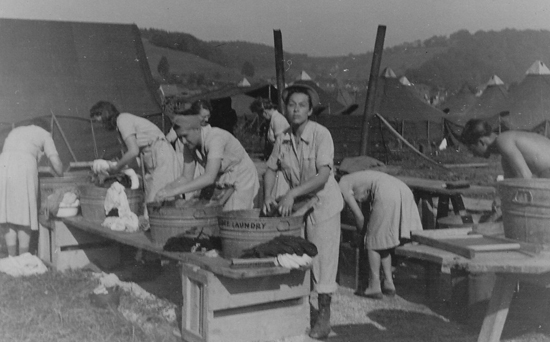
Wash day at the 59th Evacuation Hospital. Photograph taken in Heidenheim, Germany.
By the way, in case you are wondering why I have chosen the title of “Tinkling,” the first time I heard the word used in that manner for that purpose, I thought it expressed the situation rather well. My Godchild, who at present is the tender age of four, has been using the word since she could talk. In fact, I believe it is the first word her Mother taught her, her Mother being a Nurse, too, and very practical. Can’t you just hear her, “Mommie, I have to tinkle!”
Edna Haertig 1948.
Chapter I – Trains:
It is particularly natural for people to feel a sort of modesty about “going to the bathroom.” It probably has something to do with home environment. I can remember when I was in High School, how miserable we gals often were out on a date, too bashful to tell the current swain that we had to go, but all sorts of phrases have been invented since then. The most popular being, “seeing a man about a dog,” “going to the little girls’ room,” “powdering your nose” and just plain old “I gotta go!” But I have found lately that it is only necessary to say, “Will you please excuse me?” The rest is always quite obvious, since there is only one direction in which to go.
Upon entering the Army at Fort Sam Houston, I found the setup quite up to date. There was very little occasion for embarrassing moments, as there were always enough to go around, and each cubicle had its own privacy. Therefore, it really wasn’t until we got overseas and into the field that difficulties arose.
Twenty-three of us embarked from Fort Sam by our own private Pullman to Camp Blanding, Florida, to join our unit there for overseas duty. Naturally, we were all excited. The trip took three days, with a one-day stop in New Orleans. I could write an entire book on just our day in that wonderful city. If you have never seen a group of Texas girls on the loose in that city for the first time…but I won’t talk about that now. I don’t suppose there are very many people who have not ridden a train, and I am sure they can all say the same thing about the restrooms on a train. The line is always long and the place is always dirty, and there is always a draft. But being cooperative gals and practically strangers, we stood the trip without any mishaps. I might add that the Hospital ran out of cascara (a mild laxative derived from the bark of the cascara buckthorn plant) and mineral oil our first day at Camp Blanding. That’s how polite we were.
The trains in the States really aren’t so bad, after all the U.S. is the only country in the world with a good plumbing system. Now riding a troop train in foreign countries is about the worst thing that can happen to anybody. Hey, you veterans, don’t you agree? That was a pretty long ride from Oran to Constantine – it took five days. By the time we got there everybody was either constipated or had diarrhea, or collapsed bladders. There were at least fifty girls to each car, and two bathrooms. Now, there are all types of girls. Perhaps I’d better allow a paragraph for each type, and then you can figure out why we landed at our destination in the shape we were in.
The neat type: These are the girls who have to have their daily bath and clean underwear, the ones who take up thirty minutes at a time in the bathroom at least three times a day; couldn’t stand a little engine soot on their hands, faces and collars; had their underwear, which they had taken time to wash, strung out all over the place; come out looking fresh and clean while the lineup was standing on one foot and then on the other. I must add right here that the line formed at 6 a.m. (after all, they woke us up for breakfast at that time.) When I looked in the mirror, I could understand why the Arab children said they wanted to buy me “for Papp.”
The magazine type: Reading “on the throne” is a favorite method of long concentration and deep thought, but there is a time and place for everything, or I used to think so. Now this type would take a mystery story or a magazine along, probably the Readers’ Digest, and be totally unaware of the stormy mutterings and wall poundings on the outside. This type was about as unpopular as the neat type. She steps blithely out eventually, with the remark, “Oh, have you been waiting on me?” Incidentally, there is more of this type than the neat type. I enjoy reading on the throne myself, but not when there are 50 gals waiting in line.
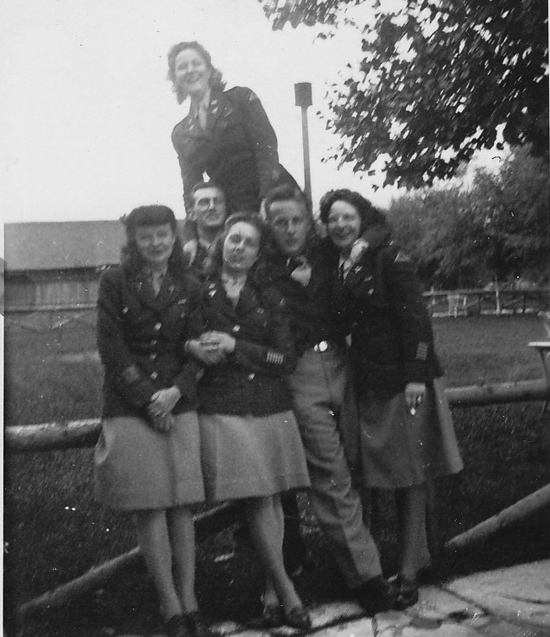
Edna (front center) and other members of the 59th wearing Class A uniforms in preparation for the 1st Infantry Division party. Ansbach, August 1945.
The gang type: These are the girls who run around in a clique and everyone loves everyone and they are always doing favors for each other. So one stands in line and just about the time you think you are next up steps a girl right in front of you. Her friend just ahead of you has been saving this place for her. This goes on until all the girls of that particular little gang have passed in and out just ahead of you. By this time, you have lost the urge and decided the best thing to do is save the next C-ration can.
My favorite type: This is of course, my category. We are the bridge-playing type. We would start right after breakfast, which consisted of a canteen of coffee and a can of cold C-rations, set up a suitcase for a bridge table and lose ourselves in a card game. After all, what is a busted bladder or a stuffed gut or two anyway? We made out alright and were the only ones still speaking when we got to our destination.
By the third day of this nightmare, one of the bathrooms was completely out of the running, being as how it was flooded and definitely not fit to use, it would have taken hip boats to get into it. It is a good thing that the Army laxatives were good and powerful and that they had plenty of them. We Nurses were supposed to be riding in first class according to African standards, so you can see what the soldiers went through in their “40 and 8s”. Everyone preferred traveling by truck, at least the truck could pull up at the side of the road and there were always plenty of bushes to go around.
Two of my tent mates and I were on a pass to Paris (oh, wonder of wonders of a City) and through a streak of luck we managed a Pullman. Now, they had the right idea. In each corner, you could unfold a sink, and below in the shelf was a little pottie with a handle on it and a lid. Now, of course, our Pullmans have a blah blah blah. But we thought this quite an improvement over our last train ride and landed in Paris (I could write a book on that City too) feeling refreshed, if you can feel refreshed with a hangover. Everyone knows how you get a hangover so there is no point in me writing about that. Besides, that isn’t what the book is about.
I didn’t ride on a train in Italy. I rode on lots of trains in England, but don’t recall ever seeing a bathroom. Don’t know just what those people do. If I had known then that I was going to attempt to put all of this on paper, I would have inquired about the situation, but the occasion never occurred. The country is so small and it takes such a short time to get anywhere, that perhaps they have no need for them.
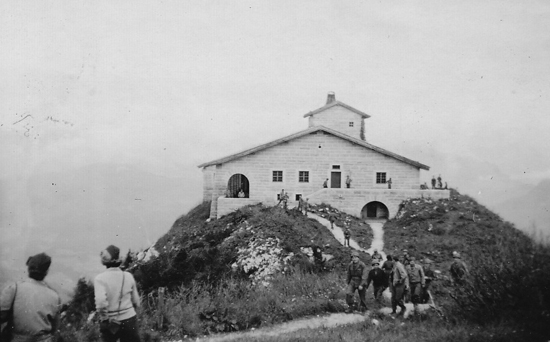
Members of the 59th Evac visit the Eagle’s Nest in the mountains above Berchtesgaden, Germany.
I think riding on trains has given my bladder a new outlook, at least it seems to be able to hold more for a longer time. It doesn’t get so impatient anymore. It really isn’t so hard to train it, just takes a little time, practice and stamina. Beer makes an excellent trainer.
Chapter II – Boats:
The sailing of the “Argentina” on July 1, 1942, for parts unknown at the time was the beginning of four years of my life. Four years of work, heartaches, troubles, narrow escapes, horrors, and fun…loads of it! You see, I was on the Argentina – me and 19 other Nurses, plus several thousand Officers and Enlisted Men plus the boat crew and sailors. I don’t believe any of us would have volunteered so readily if we had known we were going to be gone for such a long time. We even bragged to the British how we were going to win the war in a year and be back home by Christmas. You wonder why I say four years out of my life – you tell me how I can get them back and I shall take them. I am four years older, wiser, and sadder, yet I have nothing to show for those four years but wrinkles and gray hair, absolutely nothing. I took up here at home where I left off, and the in between is gone. You figure it out. However, I did make some wonderful friends who will remain friends forever.
There, I wondered off my subject again. I told you I didn’t know anything about writing a book. There were three of us in my compartment, we even had a spare bunk, for weekend guests you know. So our bathroom problems were few, in fact we had visitors from other compartments where they weren’t so lucky. I think the cutest thing about the boat was the bathtub. You couldn’t stretch out in it at all, instead there was a little ledge to sit on. It was like sitting in a chair. We couldn’t make much use of it because there was only seawater, but the last day out the Captain of the ship splurged and let us have enough fresh water for a bath. Seawater doesn’t work so good, it is alright for flushing the toilet, but I can’t think of any other good use for it.
About the third day out, diarrhea ran rampant, and the medics were chasing everyone down to get a good dose of castor oil. Can you imagine the pleasantness of that little situation? But the castor oil did the trick and everything went back to as normal as it could.
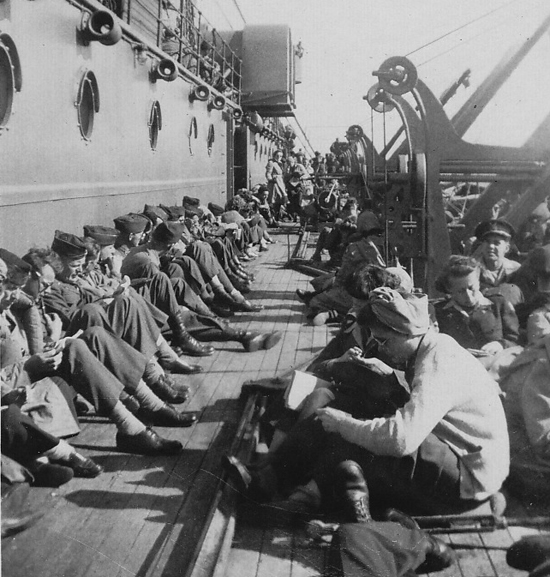
Personnel of the 59th line the decks of the “Argentina” on their journey home. 1945.
It is an interesting experience to try and keep seated when the sea is a little rough. Spots appear before your eyes, something happens to your stomach, your ears ring, the tub and lavatory take flight and you wonder any minute if you are going to do the same thing and land in the tub. Finally you decide the best place for you is on deck where there is fresh salty air, but you can’t quite figure out how to get there, especially since you still have to pull up your pants, button your slacks, tuck in your shirt and hold on to something all at the same time. But it can be done, even though you are a little green about the gills when you finally catch that first breath. It is a good thing they have rails on the ship.
I took five boat trips in these four years; twice on the Argentina, once on a British ship, a Liberty ship, and a Hospital Ship. Interesting trips all, but I must say there is nothing unusual about the respective bathrooms, all being comfortable and plentiful.
Chapter III – Latrines:
You could always tell the size of a Hospital by the number of holes in the latrines; there were nine-holers, seven-holers, five-holers, etc. Some were double-rowed where you sat back to back. Others were just single-rowed. When I was in a General Hospital, we had a double-rowed-ten-holer. It was really a beauty, and the pride of “Mud Hill,” North Africa. This is where modesty rears its ugly head again. We had just moved to Mud Hill, on the other side of Oran, waiting for shipment to Constantine. The Army went right to work and made it as comfortable as possible. All day we had sat around watching the installation of our ten-holer, some waiting rather anxiously. Then, when time came for the grand opening, everyone was too shy and modest. After all, this was our first experience at mass evacuation. Girls were blushing, and many waited until after dark. But the next morning, one glance at each other, amidst great laughter, and all modesty fled. A “latrine sorority” was automatically organized, where the latest gossip could be exchanged, newest jokes related, and it was the first time anyone had noticed that “Mary” had a large mole on her buttocks. “Eloise” was complimented on the drop seat she herself had fixed in her fatigues, whereas the rest of us sat and shivered, swearing we were going to do the very same thing, but we never did.
Ye Ole Latrine became the ideal place for finishing that mystery, without grumblings and curses. You could sit there for an hour if you wished, and many of us did, gossiping and reading. Some even brought their knitting.
We moved from Oran “Mud Hill”, North Africa in February to Constantine. Naturally, we took our ten-holer with us and set it up in grand style, within walking distance of our tents, or should I say within running distance. Our biggest trouble started with the Arabs. Do you know that these people can steal the shoes off your feet while you’re walking and you won’t even know it? Our pickpockets and petty thieves here in the States could sure take some lessons from them. There must have been a material shortage because our latrine screen would be missing nearly every morning. The MPs really had a time. One time, a girl was sitting inside while a couple of Arabs blithely removed the screen and slowly walked away. She really got caught with her britches down!
I transferred to an Evacuation Hospital after the Tunisian campaign and felt degraded – the latrine was only a five-holer. But the chitchat and the “latrine rumors” were about the same. We had a right cute one in Anzio, it was sort of like a little house, canvas of course, but it had a door. There were slit trenches and dugouts all around it so that at a moment’s notice a person had only to take a flying leap to be safe from flying shrapnel.

Appreciative New Yorker treats Bertha Moore (left) and Edna Haertig to a special homecoming
Our first set-up in France will long be remembered. The French are a curious race of people. They’d never seen anything like us before, apparently. There was always a throng of them around the latrines and showers. We had no privacy whatsoever. We’d be sitting in our tents dressing or bathing out of the old faithful helmet and they’d walk right in, sit down beside us and watch us very intently, never saying a word. When we’d go take a shower, they’d be right there looking, looking, looking. We got to France during the fruit season, and believe it or not, many are the times they would walk into the latrines and pass out fruit to the people concentrating there. Did you ever eat a bunch of grapes while sitting on the throne? One of the girls had a bright idea. She got her little French dictionary, a board and a stick, her paints, a nail and a hammer. She printed a big sign in French “Private, Keep Out!” “Nurse Quarters!” Then she got her hammer and nail and the board and went outside to put it up. The French were very interested, helped her nail the board and stick together, pound it in the ground, then stood back and admired their work, read the sign, made a few comments, and followed her right into her tent. When she went to the latrine, they were right in behind her. These people must have been very unhappy when we moved from there.
It was a long trip too, by truck, and took twenty hours. We had a time with the lead truck, it must have thought our bladders were made of cast-iron. We would get its attention by pounding on the back wall of our truck, then our driver would motion to the one ahead, etc. until the driver of the lead truck caught on. He got right ornery about it all and would always pick a place to stop where there weren’t any bushes or trees. But we fooled him, by putting four blankets together with a girl at each corner to hold it up. Then everyone took turns, and of course, there were the usual camera fiends. I would sure like to have some of those negatives.
We left sunny France and got into the rains. At our next set-up, it rained continuously and it was as cold as blazes. We had to wade knee-deep to get to the latrine, and then it was too cold to pull our pants down, so everyone took to taking gallon cans out of the garbage cans, to their tents. One of the Red Cross girls stepped right out of her overshoes and never did find them again – the mud just swallowed them.
We had orderlies to clean our latrines every day and they would put so much Lysol and lime around that it was dangerous to light a cigarette. The story ran around that a latrine actually blew up because a Nurse lit a cigarette in it, and all present got severe burns you know where.
By the time the war was over, and we were on our way home, our little old five-holer had actually become comfortable. The sharp edges had gotten nice and round and we all hated to say goodbye. Whenever an outfit would move for other parts, the latrine pits were closed with a nice mound of dirt on top, then a sign that read “Old Latrine” was stuck on top. A couple of GIs tell the story of running across one of these mounds with fresh flowers at each end. A couple of French girls thought it a soldier’s grave and put fresh flowers on it every day.
When I got to the States, I thought it would be a joy to have privacy in my bath and otherwise. But, after settling down on a nice comfortable commode, with the door shut, I was lonesome as hell.
Chapter IV – Foreign Types:
Everyone has heard of the sidewalk latrines in France and Italy. The soldiers of the First World War talked about them, remember? Well, it is true, they are there. Each one has two sides, a partition in the center, and sort of a screen around the thing. You can see the feet sticking out and the top of the head if they are standing up. Imagine, you don’t even have to interrupt a conversation, as you can just stand right by and keep on talking. It is all very friendly and casual. I never had the courage to use one or even look inside of one, but it is more convenient than going to a filling station or into a hotel.
Another thing that amazed me, is the way the men would just step anywhere, beside the road, or just turn their back to the sidewalk, or face a building. It was best to keep eyes front while driving in the country or walking down the sidewalk or through the alley. But you know, we caught on fast. When Jo, Bert and I went to Paris, we took a tour of the Palace of Versailles and the grounds. We had to go and there were no latrines in sight. So we each picked out a nice statue on the surrounding grounds. I still think we should have carved a little plaque on the statue that said “This statue was thoroughly baptized!”
The authors would like to express their sincere thanks to Kurtis L. Atkinson, son of 1st Lt Edna Lillie Haertig Atkinson (ASN:N-734765) for kindly sharing his Mother’s story with the MRC and its readers. All of the illustrations used in this Testimony were also received from Kurtis.
